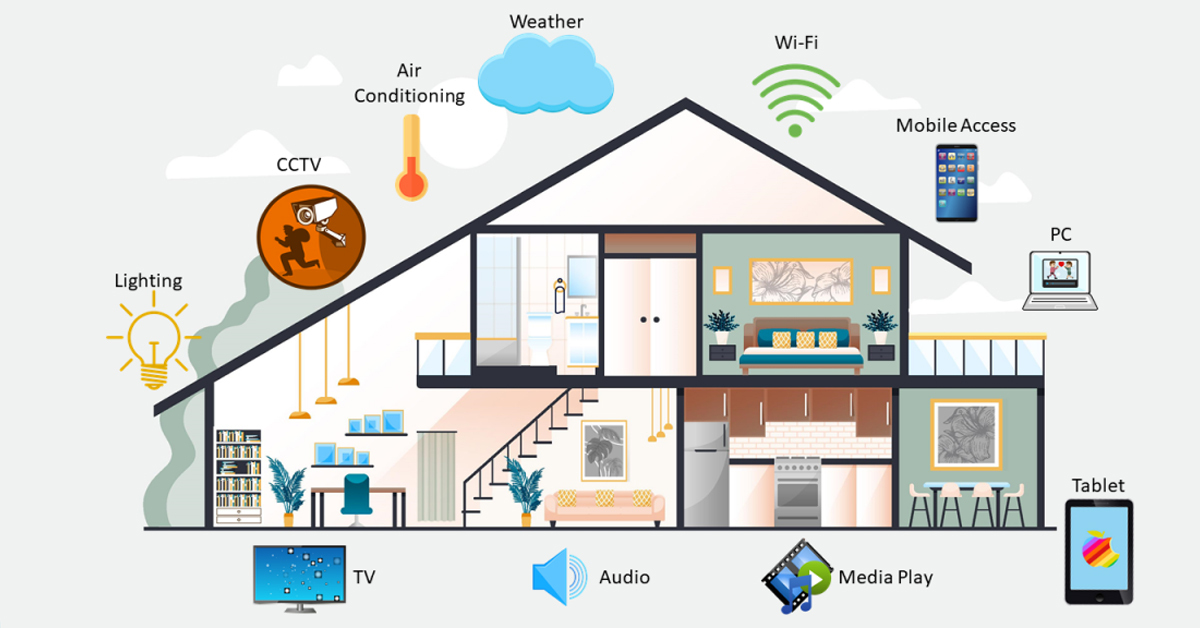Exploring Smart Home Technology Trends
Intelligent home technology has emerged as a significant force that is reshaping how we communicate with and oversee our homes within our rapidly changing technological world. The latest smart home trends are at the center of innovation as our world becomes more connected, providing homeowners with unmatched ease of use, efficiency, and security. In this thorough guide, we’ll delve into the fascinating world of connected homes, illuminating the newest tendencies, breakthroughs, and bright prospects for home automation.
The Stunning Advancement of Smart Home Technology
Let’s pause for a moment to reflect on our progress before diving into the most innovative trends in technology for smart homes. Home automation, another name for smart home technology, has changed dramatically in recent years. What was once only found in science-fiction novels is now a common occurrence in many homes.
To enable centralized control and automation, technological innovation in smart homes involves integrating various appliances and systems inside a home. These innovations improve our way of life by providing comfort, energy effectiveness, and increased security.
Innovations in Home Automation:
Progressive advancement in home automation is one of the key developments in smart home technology. Through a fully integrated system, homeowners can now easily control many different elements of their homes, such as cooling and heating, lighting, and security. This degree of automation increases comfort and energy effectiveness.
IoT in smart residences:
A revolution in electronic homes has been sparked by the World Wide Web of Things (IoT). Now that everyday objects have sensors and connectivity, they can talk to each other and with homeowners. The development of intelligent ecosystems that can meet our needs is made possible by this connectivity.
Voice-Activated Smart Devices:
Voice-activated smart devices, such as virtual assistants and smart speakers, have become ubiquitous in modern homes. These devices provide hands-free control over various functions, from playing music to adjusting thermostats.
Energy-Efficient Smart Homes:
Energy efficiency takes center stage in smart home technology trends. Smart thermostats, lighting systems, and appliances empower homeowners to reduce energy consumption and cut utility bills. Moreover, these innovations contribute to a more sustainable future.
Security and Surveillance Systems:
Smart home security systems have undergone significant advancements, offering features like facial recognition, remote monitoring, and integration with other smart devices. Homeowners can now enjoy peace of mind through advanced security solutions.
Smart Home Entertainment:
The integration of entertainment systems into smart homes has created immersive experiences. From home theatres with high-definition sound to smart TVs seamlessly connecting to streaming services, entertainment has never been more accessible.
Connected Appliances:
Smart appliances, including refrigerators, washing machines, and ovens, can be remotely controlled and offer valuable insights into their usage. They enhance convenience and efficiency in daily tasks.
Sustainable Home Technology:
Sustainability is a pressing concern, and smart homes are embracing eco-friendly technology. Solar panels, energy-efficient HVAC systems, and water-saving devices are becoming integral components of modern homes.
Smart Home Integration:
Interoperability stands out as a key trend in smart home technology. Homeowners seek systems and devices that can seamlessly communicate and collaborate, creating a unified and user-friendly experience.
Future of Home Automation:
The future of home automation holds boundless possibilities. From augmented reality interfaces to predictive analytics that anticipate your needs, the evolution of smart homes promises excitement.
Home Health Monitoring Devices:
Smart home technology extends its reach into healthcare. Home health monitoring devices empower individuals to track their health metrics and share data with healthcare providers, enhancing remote patient care.
Smart Lighting Solutions:
Smart lighting systems offer customizable and energy-efficient illumination. They can adjust to your preferences, save energy, and even synchronize with your circadian rhythms.
Artificial Intelligence in Home Automation:
Artificial intelligence (AI) empowers smart homes to become even smarter. AI-driven systems can learn from your habits and adapt to your needs, making your home truly intuitive.
Home Theater Systems:
Home theatres transform with cutting-edge technology, delivering cinematic experiences without leaving your home. High-resolution projectors, immersive sound systems, and 4K displays are becoming standard.
Wireless Connectivity in Smart Homes:
Wireless technology, including Wi-Fi 6 and 5G, fosters faster and more reliable connections within smart homes. This is pivotal for seamless communication between devices.
The Promise of Smart Homes: A Bright Future:
As we explore these smart home technology trends, it’s evident that the future of home automation is exceedingly promising. Smart homes will continue adapting to our needs, offering increased comfort, convenience, and sustainability. The integration of AI, IoT, and advanced connectivity will push the boundaries of what’s achievable in the realm of smart living.
Conclusion
Smart home technology trends are reshaping our homes and lifestyles, providing a glimpse into a future where our living spaces are more intuitive, efficient, and connected than ever before. Whether it’s controlling your home through voice commands or reducing your carbon footprint with energy-efficient solutions, smart homes are here to stay, and their potential is boundless. Embrace these trends, and you’ll be well-prepared for the thrilling future of home automation.
FAQs
Q1: What are the primary benefits of smart home technology?
A1: Smart home technology offers numerous benefits, including increased convenience, energy efficiency, improved security, and the ability to customize your living space to suit your preferences.
Q2: How can I start upgrading my home with smart technology?
A2: To begin, identify your priorities and the areas of your home where you’d like to implement smart technology. Start with one or two devices, like a smart thermostat or lighting system, and expand from there.
Q3: Are smart homes secure from cyber threats?
A3: While smart home security has improved, it’s essential to take precautions. Use strong, unique passwords, keep firmware updated, and consider network security measures like a dedicated guest network.
Q4: Will smart home technology increase my home’s resale value?
A4: Smart home technology can enhance your home’s appeal to potential buyers, potentially increasing its resale value. However, the impact may vary depending on the market and the specific features installed.
Q5: What is the lifespan of smart home devices?
A5: The lifespan of smart home devices varies, but many are designed to last several years. Regular updates and maintenance can help extend their longevity.
Q6: Can I integrate different brands of smart devices into one system?
A6: Many smart home ecosystems and platforms allow for the integration of various brands and devices. Research compatible systems and consider using hubs or controllers for seamless integration.
Q7: Are there privacy concerns with smart home technology?
A7: Yes, privacy is a concern. Ensure that you understand the data collection practices of your devices and platforms, and take steps to protect your privacy, such as reviewing and adjusting privacy settings.









